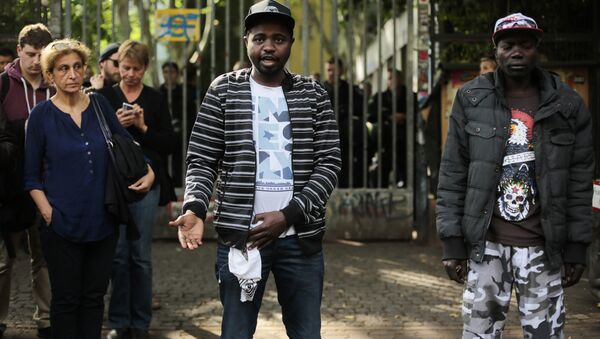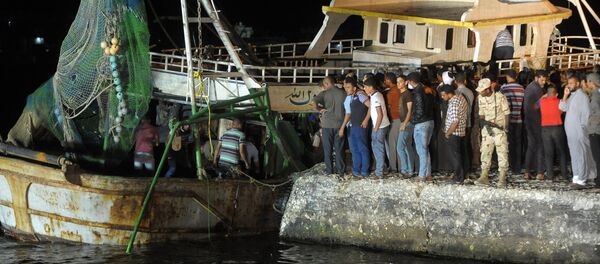The country's first migrant transit center opened its doors in the southern federal state of Bavaria on Wednesday.
Hard-Won Compromise
The decision to set up such centers was the result of a compromise reached between German Chancellor Angela Merkel and Horst Seehofer, the interior minister and the leader of the Christian Social Union (CSU) party. The deal was clinched amid Seehofer’s threats to resign unless the government accepted his proposal to pursue tougher migration policy and turn away migrants who have already been registered as asylum seekers in other EU countries or denied asylum.
READ MORE: EU May Provide Funds to Morocco, Tunisia to Stop Migrant Flow to Spain — Source
The chancellor demonstrated her ability to seal the last-minute deal ending a political standoff with her interior minister and, at the same time, the fact that she remained a staunch defender of her "caring for the migrants" policy. Seehofer was authorized to build such transit centers as part of his "migration master plan." The concept behind the centers is that asylum seekers will be kept there until their right to stay is determined; faster and more efficiently.
Will it Expedite the Process?
The name of the centers is an acronym based on the three German words Ankunft, Entscheidung, Ruckfuhrung (arrival, decision, return). Yet, critics are prompt to say that it will be mostly centers that take migrants in. The thing is that inhabitants of such centers will keep the right to appeal. Meanwhile, decisions in the past show that some 40 percent of migrants, ordered out of the country by immigration authorities, were later granted asylum in court.
READ MORE: Italian Minister Accuses Turkey of Not Fulfilling Migrant Deal Despite EU Money
Proponents of the measure note that Anker centers will house all relevant government agencies, so the entire asylum process could be expedited, in a "one stop" approach. Instead of distributing asylum seekers across municipalities, up to 1,500 people will be held in each of the centers.
The Greens, who speak in favor of accelerated asylum procedures, seemingly should back the measure, yet the party also shares its related concerns over.
"Lawsuits need to get faster. It is necessary to ensure that the decisions of administrative courts are more uniform, thereby laying the groundwork for faster procedures. We have submitted a corresponding bill to the Bundestag and Bundesrat [Germany's two legislative chambers]. In order to proceed swiftly with procedures, initial applications (arrival centers), identification, medical examination as well as social and procedural counseling should take place under one roof, as is now the case in many countries. This not only provides clarity for the refugees, but also for the communities in which they are distributed," Gesine Agena, The Greens spokesperson for women’s rights, told Sputnik.
Human Rights Concerns
The Greens have, however, suggested that the plan contravened Germany’s post-war constitution, which guarantees a right to family life.
Agena also stressed that such centers should ensure rights of arriving girls and women.
"Violence against women is never and by anyone acceptable. We therefore campaign for consistent protection for girls and women and want to ensure that this is enforced in the first places of arrival in Germany," she noted.
Another piece of criticism concerns children, as is the case everywhere in Europe, when children are kept with their parents in closed centers; often because the parents have tried to flee.
"Camps are no place for children. These facilities are conceived as an obstacle to integration by government decree. Being permanently confined to mass housing facilities is catastrophic for those affected. Child development is a fundamental right. The same rights apply to a refugee child as any other children such as access to education, health care and protection," Susanne Krueger of the Save the Children NGO told Sputnik.
Gain or Loss of the Coalition?
The fact that the new measure has not been met with unanimous support in Germany has been demonstrated by the fact that several German states have either refused or postponed the decision to host such centers, so as to wait and see how it will work.
In Seehofer’s state of Bavaria, the polls indicate that the CSU is losing to the Alternative for Germany (AfD) party, which seems to be capitalizing on the anger of the citizens whose land was the first to take in the hundreds of thousands of migrants that Merkel’s government let in in 2015 and 2016.
"We see what happens now in Spain, with the growing flow of African migrants crossing from Morocco. In fact, we are experiencing one of the most brutal consequences of Merkel's policy of open borders. Africans now see it as their right to live with us in Europe at our expense. With extreme force, they enforce this supposed right. I even go so far as to speak of an attack on Europe and our values. The people who attacked Ceuta [Spain's north African enclave] and managed to get in, are not persecuted people seeking protection," Andreas Kalbitz of AfD told Sputnik.
Kalbitz harshly criticized the government’s open-door policy which, according to him, encourage migrants arriving in the country "with a tough calculation" and hope for "a care-free life with free food and lodging."
"Hundreds of thousands have done it since 2015. It is our duty to ensure that they do not arrive here and plunder our social systems. To do that, we must protect our borders and apply our laws. The Anker centers do not change anything to the slow process of selecting the real refugees from the economic migrants. Seehofer should have resigned after the slap in the face he received from Merkel! If the old parties are no longer able to apply our laws, AfD must very soon take responsibility for this!" he argued.
Will the Anker centers implement a hardline approach and facilitate the end of the residency of people who have little chance of remaining? Will there be more deportations than before? The next year will tell.
Meanwhile, with a key regional election in Bavaria in October, and the ruling CSU risking losing its absolute majority, the new facilities seems to be part of efforts to show CSU voters that Seehofer and the party have migration under control, three years after more than a million people arrived in the country, largely through Bavaria.





